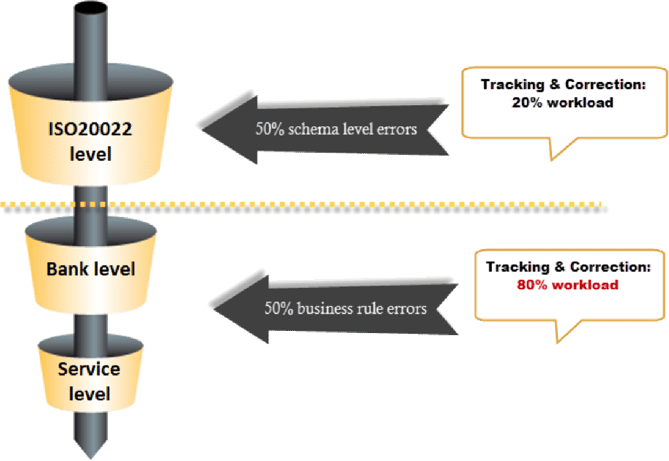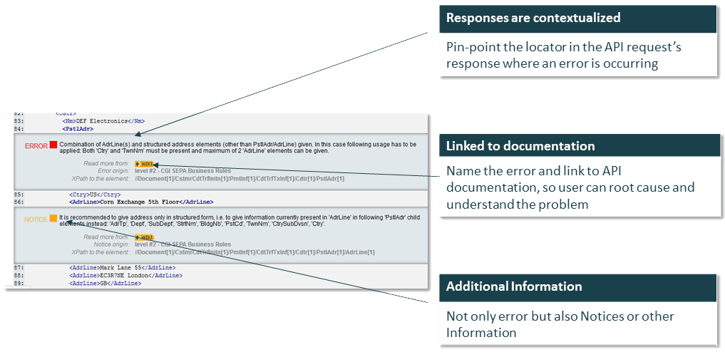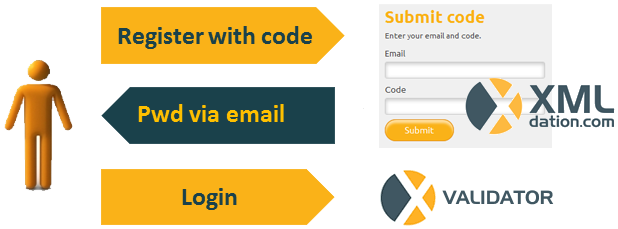Easy access to XML validation is key in customer on-boarding
Strengthening support for corporate customers has repeatedly proven to be one of the most effective means to speed up XML migration and implementation. XML validation takes center stage during the early phase of these projects, helping to efficiently eliminate both schema and business rules errors. Instant and low-threshold access to a powerful validation engine is a highly appreciated form of e-support, providing corporates with a supreme experience while significantly reducing banks’ effort.
Errors in XML messages often have a small cause, but locating and fixing them can be a time-consuming process. Corporate customers are therefore in need of an easy-to-use means to validate their messages, in order to ensure compliance with the according schema and business rules.
The traditional approach, where a bank’s customer support accepts XML messages by e-mail, validates them and sends back a report is an unsatisfying and resource-intensive manual process. With the availability of flexible and user-friendly online validation services, banks can contribute to their customers’ satisfaction by providing direct access to the service. Ideally, such service can become a smart partner for the developer, instantly available as the need emerges.
The 80/50 rule of XML development
As in many areas of business, the Pareto principle – commonly referred to as “the 80/20 rule” – can help to make processes more efficient in XML implementation. Understanding that 80% of effects originate from a comparatively smaller share of causes informs the search for an efficient solution. In XML development, observed distributions suggest the existence of an “80/50 rule”:

the benefit of a self-service validation service becomes obvious.
While about half of XML errors originate from schema errors that can be tracked and fixed rapidly, the remaining 50% of errors easily consume up to 80% of project time. Bank’s rules commonly limit the baseline definitions of ISO 20022 or add new interdependencies of attribute values. In consequence, complex business rules lead to a need for repeated validation of iterative changes.
It is obvious that running such repetitive processes through a customer service helpdesk is neither pleasant nor productive. As customers can independently access a validation service, revalidation is merely the matter of a few clicks in the browser; advanced solutions like the XMLdation Validator even allow partial or total automation through an API.
Not just faster, but better
But the benefit of a self-service validation tool does not only result from the reduced need for personal communication and the sped-up repetition of validation runs. From a developer perspective, the most immediate benefit is a high-quality error report.
Compared to classic validation tools, capable to highlight what fields in a XML messages fail to validate, a user-friendly service such as the XMLdation Validator further highlights the focus on customer support by providing actionable instructions along with easy-to-read error messages. Since the validator knows all the schema and business rules, it can not only point out where a file contains an error but suggests corrections or illustrate possible interdependencies.

and provides explanations and links to support their quick resolution.
The usability of the user interface and the quality of error reports are crucial factors for a successful on-boarding process. With a built-in logic supporting developers to efficiently implement XML based on the applicable business rules, the self-service tool replacing the former contact with help desk staff is not a plain efficiency measure but the base for truly improved customer support.
Open example report here (pdf)
Instant access for instant benefit
Banks providing validation services to their customers using the XMLdation Validator benefit from a flexible licensing model. The bank provides access tokens to their customers, enabling self-service registration of a user account. User activation is instant, with no waiting times for the customer, since access rights have been pre-approved during token generation. Once registered, customers can start using the service immediately.

As a further service element, banks have access to monitor their customers’ use of the service, which provides their help desk a good understanding of the circumstances when customers ask for assistance on more complex issues. If desired, the web interface to XMLdation’s service can also be white labeled for a consistent brand experience.
Validation – an integral part of XML management
The XMLdation Validator is not limited to XML: various other file formats (like CSV, fixed length and MT) and even JSON requests can be validated as well. And for truly holistic XML guideline management, banks may even maintain the validator’s rule sets themselves: using XMLdation myXML to maintain and store schemas and rules, the bank can grant their customers access to a validation engine that always uses the latest definitions and provides instant and up-to-date documentation.
XMLdation Validator® is the leading XML validator for payments, e-invoices and other financial messages. It validates the structure and syntax defined by the XML schemas as well as bank-/customer-specific business rules and business logic. XML Validator® is a fully secured cloud-based service with context-sensitive validation and automated real-time feedback. It tests and validates payment-related ISO 20022 XML files (SEPA, non-SEPA, PACS, CAMT etc.) along with other XML types/standards and JSON.
About XMLdation
XMLdation is a world leader in financial messaging. Our solutions are designed for banks and clearers.
Our solutions Request a demo today Subscribe to our newsletter

